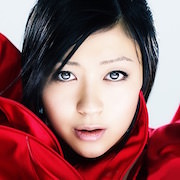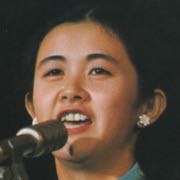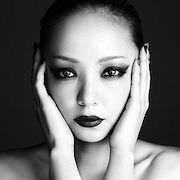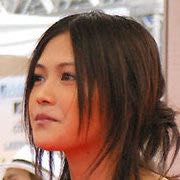Yumi Matsutoya (松任谷 由実, Matsutōya Yumi, born January 19, 1954), nicknamed Yuming (ユーミン, Yūmin), is a Japanese singer, composer, lyricist and pianist. Generally the writer of both the lyrics and the music in her songs, she is renowned for her idiosyncratic voice and live performances, and is one of the most prominent figures in the history of Japanese popular music.
Her recording career has been commercially successful with more than 42 million records sold. In 1990, her album The Gates of Heaven became the first album to be certified "2x million" by the RIAJ, and she has had twenty-one No. 1 albums listed on the Oricon charts. She is the only artist to have at least one number-one album every year on the Oricon charts for 18 consecutive years.
After gaining several years of experience as a session musician, she debuted as a singer-songwriter in 1972. During her early career, she worked under her birth name Yumi Arai (荒井 由実, Arai Yumi). In 1975, Arai became known as a composer for "Ichigo Hakusho wo Mou Ichido", a commercially successful song recorded by the folk duo BanBan. She also gained popularity as a vocalist in the same year through the success of "Ano Hi ni Kaeritai", which became her first number-one hit on Japan's Oricon Charts. Other famous songs include "Haru-yo, Koi" and "Sweet, Bitter Sweet".
In The Encyclopedia of Contemporary Japanese Culture, it is written that "Yuming incorporated influences from progressive rock and European pop to produce a sophisticated, upper-middle-class female Japanese voice and sound in a contemporary musical and journalistic world dominated by discussions of folk music and social critique. This musical idiom is generally thought to have been first realised on [...] Cobalt Hour". The album The 14th Moon and the three albums that ranked in the top 10 of the Japanese charts in 1976 (Cobalt Hour, Yuming Brand, and Hikōki-gumo) "contained several songs which are considered to be early classics of the J-pop genre."
After marrying her musical collaborator Masataka Matsutoya in 1976, Arai began recording under her married name and has continued to do so. Throughout the 1980s, Matsutoya's music was prominently featured in advertisements for Mitsubishi Motors in her native Japan and her image was used to promote their vehicles. In addition to multiple hit singles, she has obtained enormous commercial success on the Japanese Albums Chart, particularly during the late 1980s and the first half of the 1990s.
The magazine Shūkan Gendai ranked Matsutoya third (behind only Miyuki Nakajima and Masayoshi Son) in a list of the smartest Japanese figures that was determined based on the criteria of "intelligence, determination, sensibility and capability".






























